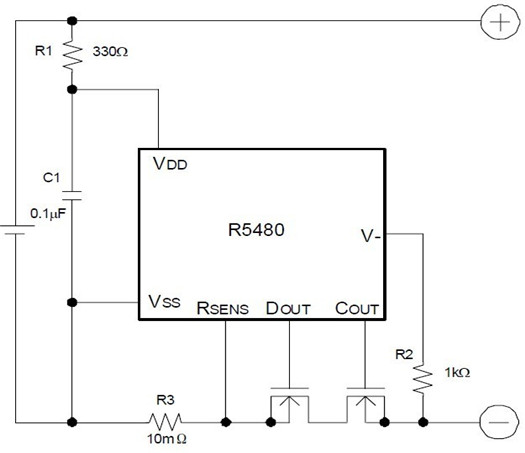
*R1 and C1 stabilize a supply voltage to the R5480. A recommended R1 value is equal or less than 1kΩ. A large value of R1 makes detection voltage shift higher because of the conduction current flowed in the R5480.
Further, to stabilize the operation of R5480, use the C1 with the value of 0.01μF or more.
*R1 and R2 can operate as a current limit against setting cell reverse direction or applying excess charge voltage to the R5480. While small value of R1 and R2 may cause over power dissipation rating of the R5480, therefore a total of “R1+R2” should be 1kΩ or more. Besides, if a large value of R2 is set, release from over-discharge by connecting a charger might not be possible. Recommended R2 value is equal or less than 10kΩ.
R3 is a resistor for sensing an excess current. If the resistance value is too large, power loss becomes also large. By the excess current, if the R3 is not appropriate, the power loss may be beyond the power dissipation of R3. Choose an appropriate R3 according to the cell specification.
The typical application circuit diagram is just an example. This circuit performance largely depends on the PCB layout and external components. In the actual application, fully evaluation is necessary.
Over-voltage and the over current beyond the absolute maximum rating should not be forced to the protection IC and external components.
Although the short protection circuit is built in the IC, if the positive terminal and the negative terminal of the battery pack are short, during the delay time of short limit detector, large current flows through the FET. Select an appropriate FET with large enough current capacity to prevent the IC from burning damage.
We are making our continuous effort to improve the quality and reliability of our products, but semiconductor products are likely to fail with certain probability. In order to prevent any injury to humans or damages to property resulting from such failure, users should be careful enough to incorporate safe measures in design, such as redundancy, fire-containment, and fail-safe feature. We do not assume any liability or responsibility for any loss or damage arising from misuse or inappropriate use of the products.
If the positive terminal and the negative terminal of the battery pack are short, even though the short protection circuit is built in the IC, during the delay time until detecting the short circuit, a large current may flow through the FET. Select an FET with large enough current capacity in order to endure the large current during the delay time.
Sense resistance and on resistance of the MOSFET selection guideline
Short mode is detected by the current base or the relation between VDD at short and total on resistance of external MOSFETs for Cout and Dout.
If short must be detected by the current base determined by Vshort and R3, the next formula must be true, otherwise, the short current limit becomes (VDD*-0.9)/(R3+Rss(on))
VDD*-0.9 ≥ Vshort
R3 Rss(on) R3
*Vshort = 0.180(V)
*R3 = External current sense Resistance(Ω)
*Rss(on) = external MOSFETs’ total ON Resistance(Ω)
*VDD* = VDD level at short mode. If VDD goes down by the short current, the lowest level is VDD*.
Notes: in case of the short mode is specified at short current determined by
the relation between R3 and Vshort value,
ex. 1
*As the Rsense, in case that the 5mΩ is selected as R3 and if the VDD*
becomes 3.0V, to detect short at 36A with Vshort = 0.18V, the Rss(on)
must be 53mΩ or lower.
ex. 2
*As the Rsense, in case the 10mΩ is selected as R3 and if the VDD*
becomes 3.0V, to detect short at 18A with Vshort=0.18V, the Rss(on)
must be 106mΩ or lower.

